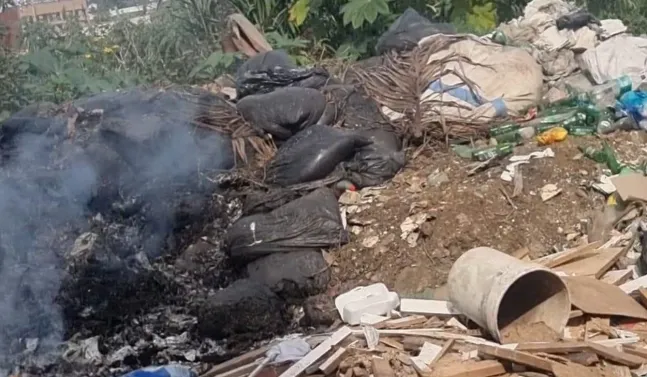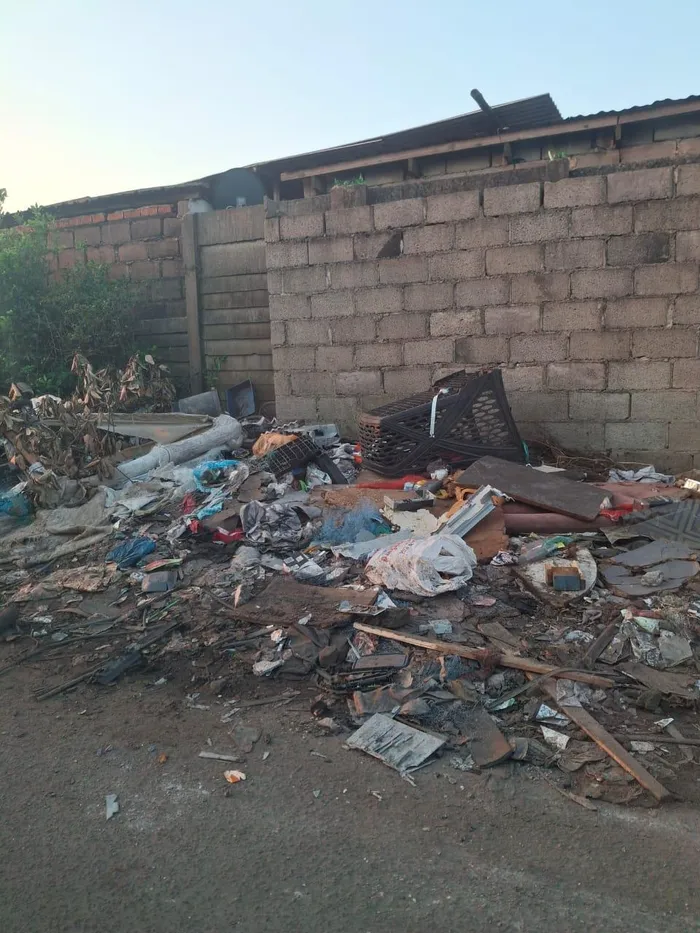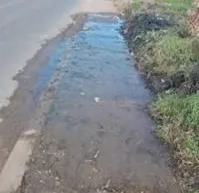
Burning of waste and other material such as tyres in Tongaat have resulted in air pollution.
Image: Supplied
ETHEKWINI residents have raised the alarm over the escalating air and water pollution, illegal dumping, and inadequate waste management.
Rachel Naidoo, secretary of the Tongaat Civic Association, said water and air pollution remained a growing environmental issue in the community.
“Our primary concern is water pollution and its impact on our rivers and waterways. The sources of water pollution have been identified as industrial discharge, urban run-off, and failing infrastructure which has resulted in sewer spillage into the rivers and waterways. There is also poor management of waterways such as the lack of clearing debris.
“In addition, the streets of Tongaat are littered with the sugar cane debris. You will also find that trucks carrying the sugar cane often drop debris that finds its way to the watercourses. In addition, the untreated effluent that is used to irrigate the cane fields also enters the waterways. Sewer discharge is common in coastal areas and inland like the Hlawe River which runs through the Tongaat CBD. The stench emanating from this river is unbearable.
“Urban run-off also affects the rivers and streams particularly from the informal settlements primarily due to poor sewer and waste management services by the municipality,” she said.
Naidoo said air pollution was also a concern and that residents who suffered with chronic illnesses such as sinusitis and asthma were impacted.
“One of the great sources of pollution emanates from the industrial businesses such as the sugar mills. There is always dust and an odour in the air. The irrigation of sugar cane fields with untreated water causes an unbearable stench and discomfort to residential areas bordering these sugar cane fields.
“The industrial areas in Tongaat are characterised by plumes of black smoke entering the atmosphere. To add to this, the burning of sugar cane fields during the harvesting time adds to the pollution. It appears air quality management is very poor or non-existent.
“Domestic fires are also a great problem. However, poor refuse management services by the municipality results in residents, particularly in the informal settlements, burning their refuse,” she said.
Naidoo said littering and lack of recycling initiatives contributed to the deteriorating environment.
“Litter, plastic in particular, finds its way to our rivers and streams. The municipality must improve its waste management services and invest in recycling initiatives,” she said.

Illegal dumping is a great concern in Clairwood.
Image: Supplied
Ravin Brijlal, public relations officers for the Clairwood Ratepayers and Residents Association, said some of the environmental issues included air pollution and dumping due to an influx of businesses.
“The rapid growth of businesses in our area has led to increased air pollution and irresponsible waste disposal. Businesses have failed to adopt sustainable practices and adopt environmental regulations.
“There is also an excessive number of fires. Burning of dirt, tyres and other materials are not only polluting the air, but also pose serious health risks. We encourage residents to explore alternative waste management methods,” he said.
Brijlal said there was also frequent sewer overflow onto roads.
“This poses a major health and environmental hazard. However, this is due to lack of infrastructure maintenance and upgrade. In addition, there is a lack of education on the importance of recycling and proper waste management in the community. The association plans to launch an awareness campaign and workshop to empower the community. By working together we can protect our environment, improve public health and enhance the quality of life for Clairwood residents," he said.

Sewage overflows on the streets of Crossmoor in Chatsworth.
Image: Supplied
Suran Gounden, chairperson of the Crossmoor Residents Association in Chatsworth, said: “Like other areas in eThekwini, ours is not immune to the different types of pollution.
“Illegal dump sites have mushroomed in several vacant plots in Crossmoor resulting in an unbearable stench to the residents living in close proximity to these illegal dump sites. Together with the WeFeedSA programme, we had regularly cleaned up the illegal dump sites, only to find it established again the following week. Some residents have a total disregard for the cleanliness of the area. On a few occasions we witnessed a few residents dumping garbage and requested them to remove it,” he said.
Gounden said sewage overflow from manholes was also impacting the environment and community .
“We receive complaints from residents regarding blocked sewer pipes or overflowing sewage on a daily basis. However, these complaints have to be reported several times before it is finally attended to. During this time, the residents are inconvenienced and have to suffer the unbearable stench which sometimes leads to residents falling ill. Unfortunately, pollution in Crossmoor is becoming an uncontrollable problem and will not change until all roleplayers play their part,” he said.
Yogesh Naidoo, director of the Reservoir Hills Ratepayers Association NPC, said illegal dumping was of great concern.
“The Bissessar Road Landfill Site and surrounding areas, including the Sydenham Quarry Lake, have been subjected to large-scale illegal dumping, with heavy-duty trucks routinely offloading rubble despite municipal contraventions.
“These actions violate the National Environmental Management Act (NEMA) and demonstrate gross municipal negligence in enforcing environmental protections. The uncontrolled dumping not only threatens local ecosystems but also leads to infrastructure deterioration and exposes residents to harmful airborne particulates,” he said.
Naidoo said they had formally complained about toxic emissions from the dump site, which are severely impacting residents.
“Residents have raised complaints such as severe respiratory distress which include coughing, wheezing, shortness of breath, acute ocular irritation (burning eyes), headaches and nausea caused by inhalation of airborne particulates and toxic fumes.”
Naidoo said the contamination of the Palmiet River and Umgeni River had worsened due to illegal waste disposal by businesses operating without environmental oversight.
“The dumping of industrial waste, most recently contaminated sweets, raises concerns about public safety, particularly for children who unknowingly consume discarded items.
“Additionally, sewage overflows and chemical pollutants from unauthorised operations have led to deteriorating water quality, directly affecting communities that rely on these rivers. This violation of water management laws threatens aquatic ecosystems, endangers public health, and increases the likelihood of waterborne diseases. Urgent intervention is required to penalise polluters and implement stricter monitoring protocols,” he said.
Ashok Kara, an executive member of the Overport Ratepayers Association, said irregular municipal waste collection had resulted in large amounts of refuse accumulating at street corners.
“Additionally, unregulated dumping has become prevalent, further deteriorating sanitation standards. This not only affects the aesthetic appeal of Overport but also creates health hazards through increased rodent and pest activity.”
Kara said green spaces were also neglected.
“Gardens and communal green areas suffer from neglect, with maintenance efforts lagging behind demand. Poorly maintained vegetation and litter accumulation impacts the overall environmental health of the community.”
He added that a high influx of displaced individuals have placed considerable strain on water, sanitation, and stormwater infrastructure in the area.
“The existing sewer system struggles to accommodate the increased usage, leading to blockages and potential overflows. Similarly, stormwater infrastructure is under pressure, exacerbating pollution and flooding risks.”
Desmond D’Sa, an environmental justice activist, said the south of Durban was in the midst of an environmental crisis.
“With over 300 industries, including oil refineries, chemical plants, and incinerators releasing harmful substances like benzene and sulphur dioxide, the area records some of the highest asthma and cancer rates in South Africa. Factories dump untreated waste into the Umbilo and Isipingo rivers, destroying marine life and contaminating fish relied on by local communities.
“Illegal dumping fills our streets and decaying infrastructure causes frequent raw sewage spills. These are not just ‘environmental issues’ but are ongoing human rights violations, and the scale is devastating,” he said.
D’Sa, who is also the co-founder of the South Durban Community Environmental Alliance (SDCEA), said the consequences were long-term and damaging.
“Children who grow up near toxic sites are breathing polluted air that causes chronic illness. Fishers watch their livelihoods collapse as marine ecosystems die. Mangrove forests, which are essential for coastal protection, are poisoned by oil spills. Cancer and respiratory illnesses are widespread, and economic opportunities are lost as pollution drives away potential investors. This is environmental racism in action where low-income communities are sacrificed for industrial gain.”
D'Sa said communities played a great role in protecting the environment.
“Silence enables environmental destruction; everyone has a role to play. Residents should report polluters and join in campaigns that demand cleaner air and water. They can also organise community clean-ups and environmental awareness events.
“Businesses must also move beyond greenwashing. They need to transparently reduce emissions and toxic waste, recycle wastewater responsibly, and compensate communities harmed by pollution,” he said.
D’Sa added that the government’s inaction continued to enable environmental harm.
“We demand strict enforcement of existing environmental laws, including shutting down serial polluters. There should also be heavier penalties for illegal dumping and chemical spills.
“There is also a need for community-led monitoring systems with real-time pollution data access and health support for communities affected by industrial pollution,” he said.
Related Topics: